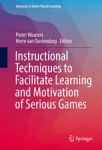27/12/2016
Nouvelle publication
 Sanchez, E. (2017). Competition and Collaboration for Game-Based Learning: a Case Study. In P. Wouters & H. van Oostendorp (Eds.), Instructional Techniques to Facilitate Learning and Motivation of Serious Games (pp. 161-184). Heidelberg: Springer.
Sanchez, E. (2017). Competition and Collaboration for Game-Based Learning: a Case Study. In P. Wouters & H. van Oostendorp (Eds.), Instructional Techniques to Facilitate Learning and Motivation of Serious Games (pp. 161-184). Heidelberg: Springer.
This chapter is dedicated to discuss how competition and collaboration for playing have an impact on the learner’s strategy and the learning process. We examine what kind of effects can be expected when competition and collaboration are used as instructional techniques. This is done through a discussion about how these concepts are defined and through a brief overview of the literature dedicated to competition and collaboration in game-based learning contexts. We also discuss the results obtained with an empirical study carried out with Tamagocours , an online multiplayer Tamagotchi-like game dedicated to teach preservice teachers how to follow the legal rules that should be applied for the use of digital resources in educational contexts. In this chapter, we consider that playing encompasses two dimensions: an individual and conflictual play with an antagonist system and a collaborative play which is based on cooperation with the game (to accept to play) and/or with teammates. Game-based learning is thus coopetitive and results from conflictual interactions and epistemic interactions when players collaborate.
http://www.springer.com/gp/book/9783319392967#aboutAuthors
23:01 Publié dans Jeux et apprentissage/games and learning | Lien permanent | Commentaires (0)



Les commentaires sont fermés.